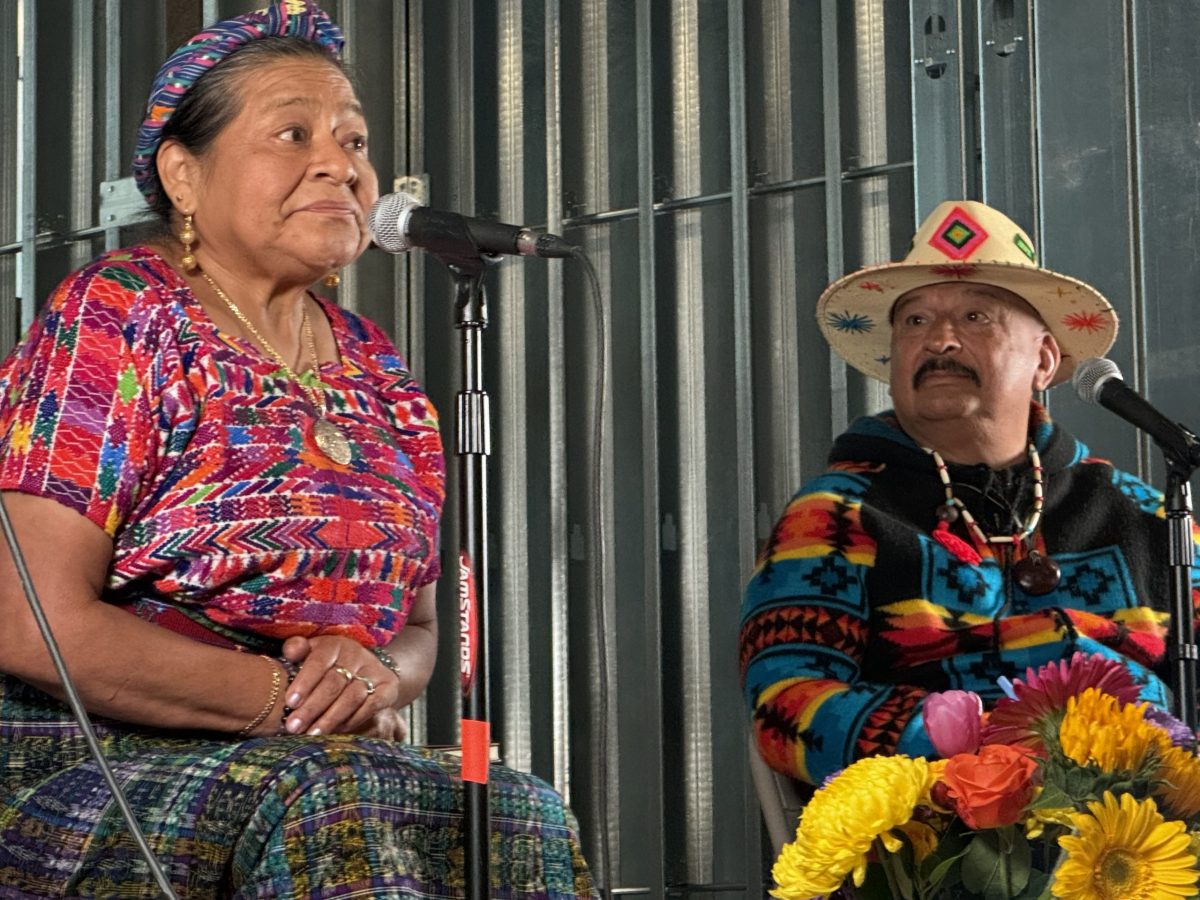Bill Wahpepah was one of the organizers of the Longest Walk in 1978, a march to bring awareness to a handful of bills in Congress that would have affected treaties with American Indians. Floyd Westerman was a part of the Wounded Knee protest in 1973 to bring attention to injustices being committed against the Lakota people. Ingrid Washinawatok advocated for Indigenous sovereignty and environmental protection. Dennis Banks helped found the American Indian Movement.
Rigoberta Menchú Tum met all these mentors’in San Francisco in the early ‘80s. Now a renowned human rights activist, she was 23 at the time, and it was about a decade before she won the 1992 Nobel Peace Prize.
“My main teachers were from here, from San Francisco. These were brothers and sisters that were my guides … representative of the Navajo, the Hopis and the Dakotas,” said Menchú Tum, who served as Carnaval’s grand marshal this past weekend in the Mission. “I understood about their struggles to defend the earth, to defend their land.”
At a reception that followed her Carnaval appearance, Menchú Tum spoke to about 300 people who joined her at the Indigenous People Cultural Arts and Healing Center at 681 Florida St. At the event hosted by Cultura y Arte Nativa de las Américas (CANA), Menchú Tum talked about her connection to San Francisco, her experience at Carnaval and the importance of humility and kindness.
Menchú Tum is a K’iche’ Mayan born in the highlands of Guatemala in 1959. Menchú Tum’s family members were among the victims of a genocide conducted by the Guatemalan government in the ‘70s and early ‘80s that killed almost 150,000 Mayans. The massacre began when the national army came after rebels who were fighting for better living conditions for Indigenous people.
Menchú Tum’s brother was arrested, tortured and killed following accusations of being part of the guerilla movement. Her mother was arrested, tortured and raped on the same accusations, and her father was arrested and tortured.
The events forced Menchú Tum, then 22, into exile to Mexico in 1981, where she began a campaign advocating for Indigenous people’s rights. A year later, she started meeting her mentors in San Francisco during one of her many visits to the city.
Menchú Tum spoke about remembering one’s elders and all the teachings that were passed on through the generations.
“We Indigenous are teachers of teachers. You are teaching a new teacher. That’s the ancestral learning that we are contemplating,” said Menchú Tum, who was greeted by a standing ovation as she took the stage in a traditional Mayan skirt and multicolored blouse.
“We are not here alone,” she said. “We continue to be professors and masters of the new professors and the new masters. So I am right now a teacher of teachers.”
Menchú Tum then referred to the importance of expressing gratitude, adding that if it were possible for her to say “thank you” 400 times at any given day, she would — she has that many people to thank. She said that every 260 days, she gives 260 thank-yous to the seven generations she knows of, a ceremony that lasts about three hours.
She also spoke about the community she has built and the kind of support she tries to provide to her friends. If someone is asking for advice it is because they need it, she said.” Sometimes, forming a connection can be simple, she said: “I ask people ‘How are you today?” said Menchú Tum.
These small acts of kindness, she said, can go unnoticed in our society, but not in Indigenous communities. She called on Indigenous people to feel lucky and proud of their roots, and to never feel like a minority, because these communities are in 94 different countries.
Towards the end of the conversation with CANA’s CEO, and District 9 Supervisor candidate, Roberto Hernandez, Menchú Tum thanked San Francisco and Carnaval organizers for the invitation to the festival and celebrated being able to attend — especially given that, a year prior, she was dealing with serious health issues.
“The message this year in honor of Indigenous people is a concept that it’s very powerful, very important, very deep and very solemn,” said Menchú Tum. “This is very special for me, and I will not forget about this moment.”
District 7 Supervisor Myrna Melgar closed the reception by awarding Menchú Tum an official city proclamation declaring May 27 as Rigoberta Menchú Tum Day in San Francisco.
“What I leave here is my eternal presence,” said Menchú Tum, “because one day I will also die. But I leave my own print here for the future generations.”
When a member of the audience asked Menchú Tum if she had tried a Mission-style burrito, she replied with a “muy rico” — very delicious — nodding and smiling as she added, “they fed me really well here.”



The article doesn’t mention Rigoberta Menchú’s imposing portrait as part of the Women’s Building mural, 18th St/Lapidge. Her earrings in the mural represent the Nobel Peace Prize she was awarded.
Good point, thank you. Lydia
The article does not mention her autobiographical book that drew international attention to the brutal lives of Guatemalan campesinos in the 1980s: “I, Rigoberta.”
Rigoberta Menchú Tum, a true hero of our time, a humbling inspiration. If she can do what she did, then we have no excuses up here.